In the July 1, 2014 Ask The Headhunter Newsletter, a reader expresses serious reservations about recruiters:
I am a 46-year-old woman who has been rendered 100% unemployable in the New Economy. I’d just like some help in understanding what’s going on. My experience with recruiters has been terrible, and as a recruiter I thought you could maybe offer some insight into why they have become so useless.
I’ve spoken with lots of other “permanently unemployable” professionals over the age of 40 and their experience with recruiters is identical to mine. Are recruiters truly incapable of providing real feedback? Why do recruiters suck so bad?
Nick’s Reply
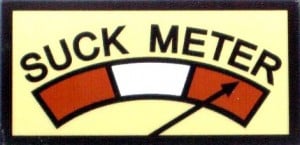 You’re opening up a can of worms. So let’s tie on our aprons and take a good look at the slop that passes for “recruiters” nowadays.
You’re opening up a can of worms. So let’s tie on our aprons and take a good look at the slop that passes for “recruiters” nowadays.
There are some very good recruiters out there — both inside of companies (in the HR department) and on the independent side (those that HR pays to deliver candidates). They are few. (See Good Headhunters: They search for living resumes.) On the whole, recruiting sucks really, really bad today.
The problem is automation
The number one problem is that recruiting is now wholly automated. Both the HR profession and independent recruiters don’t really recruit. To recruit means to go out into the world to find, talk to, assess, judge, cajole, seduce, convince and bring home the best people to fill a job for a client. This still requires getting one’s duff out of the chair from behind the desk and the computer display to actually meet people. (See Executive Search: Don’t pay lazy headhunters.)
But, show me 1,000 recruiters and I’ll show you 999 lazy keypunchers who are terrified to talk to anyone, and content to get paid for diddling their keyboards. They pay monthly fees to access huge databases of “job seekers” — and their expectation is that “the system” will deliver candidates. So, what do employers need recruiters for?
The 1,000th recruiter — who actually goes out and recruits — is worth his or her weight on gold. He doesn’t suck. The rest aren’t worth spit.
Everybody can play!
The other biggest problem is that the cost of entry to the recruiting business is virtually zero. Anybody with an Internet connection and a cell phone can play. The automation thus allows a proliferation of drive-by recruiters who run over job applicants while scratching their lottery tickets. It’s why you hate recruiters: You’re just another casualty and there are plenty more where you came from. (See Does the headhunter own my job interviews?)
I could riff on this for pages, but I’d rather just show you the very disturbing trend that proves my point: It’s not about recruiting any more. Proof lies in the “state of the art” start-up firms that get funded because idiot investors get excited about “new business models” that do absolutely nothing to advance the art and science of recruiting.
If these are the kinds of companies that have been funded, what does it tell us about the state of the business? (See Employment In America: WTF is going on?) As you put it, this is why recruiters suck so bad.
NotchUp
One of the early dim-bulb recruiting start-ups was NotchUp, started in 2008 by a couple of guys whose first concept was a “pay for interview service” that didn’t quite make it. In 2010, BusinessInsider called NotchUp a “Hot Silicon Valley Startup You Need To Watch.”
What was this exciting new concept in recruiting? It was a “crowd-sourced lead generation platform on top of social networks.”
Notchup was basically an app that was supposed to leech job seekers from social networks. It was designed to avoid recruiting. The app circulated job listings across social networks and matched them to users’ connections. Then they waited for results, just as “recruiters” inside major corporations wait for job boards to “deliver” hires. NotchUp no longer exists.
Standout Jobs
This start-up arrived in 2007. Standout Jobs was described as a “do-it-yourself, interactive career site.” A few years later, founder Ben Yoskovitz admitted, “I didn’t have a strong enough understanding of the HR/Recruitment market going in.”
Surprise: None of the clownish “entrepreneurs” looking to cash out know a thing about recruitment. They’re selling apps and database services in lieu of recruiting.
Clicking on StandoutJobs.com yields an “error establishing a database connection.” The business was acquired in 2010 by another up-and-coming online recruiting business, Talent Technology, which garnered a “top HR product” award from HR Executive magazine. The award seems to have been purged from the web, and Talent Technology Corporation is nowhere to be found online. (What does this tell us about HR Executive magazine?)
Tony Haley is a seasoned London headhunter who’s been watching these start-ups a long time. “You have people with little or no recruiting experience introducing new services and putting spin around them,” he explains, “about how they will improve the recruiting process without understanding it in the first place.”
Haley points to the real problem: HR executives who know nothing about recruiting, either. The recruiting services they turn to “match the misguided demand from employers that cheaper is better. These services encourage low-level, high-activity churn. It encourages more inexperienced people to go into recruiting — people who think they can make quick money. It drives down the quality of candidates and it hinders the speed of service.”
Referral recruiting
The main idea behind many online recruiting start-ups is “referral recruiting.” It’s simple: Recruiters suck at finding job candidates, so let’s find someone else to find job candidates, thus recruiters and employers can both avoid recruiting. We’ll introduce a cool new business model: Split the placement fee with anyone who touches the process.
I won’t waste your time with links, because most of them are dead, but the l andscape is littered with the corpses of brilliant, “award-winning” referral services: refer.com, KarmaOne, YorZ, h3.com, referrio.com, and more.
andscape is littered with the corpses of brilliant, “award-winning” referral services: refer.com, KarmaOne, YorZ, h3.com, referrio.com, and more.
When you get that call, you realize recruiters suck because the state-of-the-art in recruiting is not about recruiting. It’s about splitting recruiting fees while avoiding recruiting. And what of the employers that try out these services?
Says Haley, “Do they really think recruiters will do more for less? They will do less for less and the employers get what they pay for. Time spent working to fill jobs is minimized, which means quality is affected, speed of service slows down and the candidate experience is poor because no one really cares about the candidate. It’s all about the cost.”
Under this model, the recruiter who actually does the work is left with a tiny fraction of a fee. And you guessed it — this is how employers wind up working with really crappy recruiters, because the best ones don’t need help and aren’t going to share their fees. The intermediary “recruiting services” wind up pimping recruiters who can’t do the business themselves.
Scout Exchange
A representative from Scout Exchange (www.goscoutgo.com) tried to get me to write about this latest recruiting concept. I’ve included the URL in explicit form because the company’s mascot really is a dog. So they get their wish. The company charges employers to find recruiters who will find candidates to fill jobs.
Disintermediation, anyone?
I think what this tells us is that inept in-house personnel jockeys not only can’t recruit to find hires — they can’t find good recruiters. (Oops. We’ve inadvertently figured out why internal recruiters suck, too!)
Employers sign up for the service, which matches them with recruiters who sign up to share placement fees. Explained the rep: “Scout is an online platform that uses advanced data analytics and algorithms to find the best matches between specific job reqs from enterprise and specific third-party recruiters.”
(Note there’s no claim that anyone is matching workers to jobs. This is matching companies to recruiters. Recruiting recruiters. Do pimps have pimps?)
Tony Haley: “There are no advanced data analytics and algorithms that can account for human interaction, emotion and, therefore, decision making.” He took the words out of my mouth.
 When a job is filled after being “touched” by who knows how many parties, the employer pays a fee, which winds up shared by recruiters and Scout.
When a job is filled after being “touched” by who knows how many parties, the employer pays a fee, which winds up shared by recruiters and Scout.
I was told: “Employers benefit from Scout’s bidding feature that allows recruiters to submit talent at the placement rates they feel are appropriate, often reducing agency costs for employers.”
This service encourages recruiters to fight like dogs for the right to have their throats slit by “clients” looking for bargains. When one of these recruiters calls you about a job, do you think they’re going to take time to act professionally? That’s the game.
Better yet, what do you think happens when a recruiter bids the lowest price? Does she bite the hand that feeds her?
RecruitFi
My favorite new recruiting service is RecruitFi. The company’s Business Development Director pitched me to do a story about the company, and excitedly told me they have “gameified” recruiting. (It seems these firms spend a lot of time trying to get into blogs. Is that business development?) Like Scout, RecruitFi doesn’t improve recruiting in any way that I can see. The game is that it merely spreads around the fees employers pay. But they spread the fees farther.
Here’s how it was explained to me. Buckle in for some serious doubletalk. (I added the highlights):
“There is higher engagement with incentives, because we have a large pool it helps us keep recruiters motivated as we connect them with new clients. [sic] We want the highest quality candidates for clients and small rewards as recruiters do searches acts [sic] as an incentive to be in our community. We also pay the candidates which closes the loop of hiring conformation (as well as establishes the relationship with their recruiter and us).”
Read that part again: They pay the candidates!
I asked David Hines, an HR consultant with Human Capital Solutions, LLC, for his reaction. “This model will get 95% of back-bencher contingency recruiters to participate. The best 5% of recruiters would never play in this arena because it would quickly kill their reputations,” said Hines. “As for paying candidates… Unbelievable. I can’t believe that these idiots don’t see any ethical violations here.”
Here’s what I told the biz dev guy from RecruitFi:
“First, about 5% of independent recruiters/headhunters are really any good. The rest are fast-buck artists who will do anything to make a fee. That’s who your model will engage. ‘Engaging’ all of them is a waste of time and counter-productive. When all of them are chasing the same candidates, it pollutes the pool and makes it more difficult to hire the best people. (See Headhunters, Personnel Jockeys & Monkeys.)
 “Second, the best headhunters will not invest their valuable time to get partial fees. They’ll go work on real assignments, where the client wants the best candidates and is willing to work closely with one headhunter – even if only on contingency — who will earn a full fee. Key here is the fact that you’re not lowering the fee the client is paying – just distributing it. There’s no benefit to the client. Having ‘more headhunters’ working on an assignment has never resulted in better searches or better placements.
“Second, the best headhunters will not invest their valuable time to get partial fees. They’ll go work on real assignments, where the client wants the best candidates and is willing to work closely with one headhunter – even if only on contingency — who will earn a full fee. Key here is the fact that you’re not lowering the fee the client is paying – just distributing it. There’s no benefit to the client. Having ‘more headhunters’ working on an assignment has never resulted in better searches or better placements.
“All your model does is encourage headhunters to slit one another’s throats for the benefit of working with you. You will wind up with a pool of poor or mediocre headhunters throwing all the spaghetti against the wall that they can – to make a few bucks. The best assignments and the best placements will be done by the best recruiters.”
The best recruiters don’t play games and have no competition
Does this explain why most recruiters you encounter suck so bad? The very recruiting industry now sucks, because the newest developments are not about recruiting — they’re about introducing more hands to grab at limited placement fees, and paying even more wild dogs to abuse job applicants. They’re even paying you when you accept a job! This is the business model venture capitalists like to fund — because they don’t understand recruiting, either.
Yes, it sucks. The trouble is, employers support these “innovations” which amount to little more than recruiting recruiters to do the work recruiters inside corporations aren’t doing.
Meanwhile, the best recruiters have no real competition. They don’t play “games” or dice up fees, or abuse job applicants. For more about how to distinguish the real recruiters from those dialing for dollars, check How to Work With Headhunters… and how to make headhunters work for you. Much of the book is about how to avoid recruiters that suck. The rest is about how to profit from the best.
Let’s hear about your experiences with recruiters that suck — and about those that don’t. And tell me whether you’ve encountered any clever new “recruiting services” that actually work to your advantage — whether you’re a job hunter or an employer or a recruiter.
: :
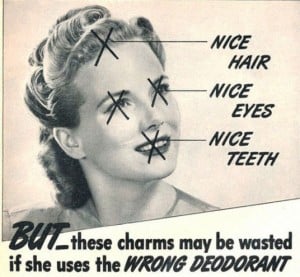 Some might say I’m over-reacting, but when six interviewers (including the recruiters) ask about your husband, something’s up.
Some might say I’m over-reacting, but when six interviewers (including the recruiters) ask about your husband, something’s up.

 d at the reviews in Glassdoor prior to the interview and, though there were negative reviews, there were overwhelmingly positive ones as well. I was concerned about the negative reviews, so I brought it up in my interview. The recruiter stated that the office prided itself on being different from its corporate parent, and he felt I was a good fit. So I took the job.
d at the reviews in Glassdoor prior to the interview and, though there were negative reviews, there were overwhelmingly positive ones as well. I was concerned about the negative reviews, so I brought it up in my interview. The recruiter stated that the office prided itself on being different from its corporate parent, and he felt I was a good fit. So I took the job. Here’s the blasphemy: You write your resume only after you’ve talked to the hiring manager. It’s not your “marketing piece” and it doesn’t “introduce you.” You introduce you.
Here’s the blasphemy: You write your resume only after you’ve talked to the hiring manager. It’s not your “marketing piece” and it doesn’t “introduce you.” You introduce you.
 I just read your expose on CareerBuilder (
I just read your expose on CareerBuilder (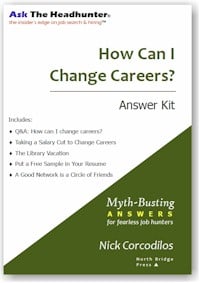 Networking is not about using people. It’s about hanging out with the people you want to work with, where they hang out — talking shop, contributing to your professional community and making friends. The
Networking is not about using people. It’s about hanging out with the people you want to work with, where they hang out — talking shop, contributing to your professional community and making friends. The 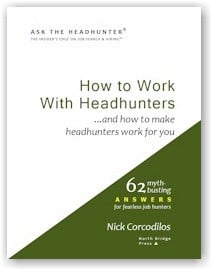
 I think it’s bulltarkus. Any company that asks you to do an interview by yourself on video might as well hire an inflatable doll. If an employer asks you to invest your time to apply for a job while it avoids investing time in you, think twice before doing it.
I think it’s bulltarkus. Any company that asks you to do an interview by yourself on video might as well hire an inflatable doll. If an employer asks you to invest your time to apply for a job while it avoids investing time in you, think twice before doing it.
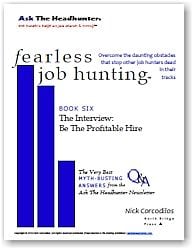
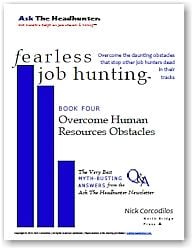
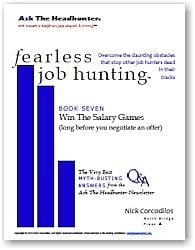
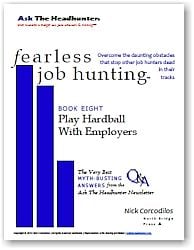


 You’re opening up a can of worms. So let’s tie on our aprons and take a good look at the slop that passes for “recruiters” nowadays.
You’re opening up a can of worms. So let’s tie on our aprons and take a good look at the slop that passes for “recruiters” nowadays. andscape is littered with the corpses of brilliant, “award-winning” referral services: refer.com, KarmaOne, YorZ, h3.com, referrio.com, and more.
andscape is littered with the corpses of brilliant, “award-winning” referral services: refer.com, KarmaOne, YorZ, h3.com, referrio.com, and more.
 “Second, the best headhunters will not invest their valuable time to get partial fees. They’ll go work on real assignments, where the client wants the best candidates and is willing to work closely with one headhunter – even if only on contingency — who will earn a full fee. Key here is the fact that you’re not lowering the fee the client is paying – just distributing it. There’s no benefit to the client. Having ‘more headhunters’ working on an assignment has never resulted in better searches or better placements.
“Second, the best headhunters will not invest their valuable time to get partial fees. They’ll go work on real assignments, where the client wants the best candidates and is willing to work closely with one headhunter – even if only on contingency — who will earn a full fee. Key here is the fact that you’re not lowering the fee the client is paying – just distributing it. There’s no benefit to the client. Having ‘more headhunters’ working on an assignment has never resulted in better searches or better placements.